 The Economist is a publication that we regard highly. It’s not for nothing that they gained a strong reputation. Sadly a recent piece on the Digital Home let them down.
The Economist is a publication that we regard highly. It’s not for nothing that they gained a strong reputation. Sadly a recent piece on the Digital Home let them down.
In the 3-9 September issue of The Economist, the leader on page 14 tells readers that ‘Most people will never turn their homes into electronic control centres‘ (sub) and that ‘convergence’ will fail.
It’s a well written, witty piece that sadly not only demonstrates the writers lack of understanding of the subject, but their disconnection with the current news.
This summary pieces doesn’t do justice to the full article starting on pages 68 which grasps many of the issues far better.
Returning from a week at IFA, I have some sympathy with the idea that the ‘dream’ that the consumer electronics (CE) companies are try to sell to the public are unlikely to be met immediately – especially in Germany where it is a well known economic fact that the population are holding on to their money with ever more zeal, in terror of losing their jobs in the current economic uncertainty.
I sat in successive press conferences, listening to each CE company CEO tell the assembled analysts and hacks that, unlike the technology companies, They Understood the consumer. This lead them to announce a parade of nearly idential product line-ups, which frankly all blurred into one.
 This was repeated with halls and halls of identikit stands. Remove the brand names and it would have been a challenge to tell them apart.
This was repeated with halls and halls of identikit stands. Remove the brand names and it would have been a challenge to tell them apart.
The exception was Sony, whose bold attempt to live their strap-line, ‘Like.no.other’, lead to a stand that didn’t line up endless products, but played with your senses and tickled your emotions. Sadly the majority of journalists _hated_ it – perhaps saying more about the state of journalism in this fields than the stand itself.
The Tech co view
Until now, the main focus of technology companies has been to sell as much equipment and services to the business market. Having reached total saturation, and business becoming unwilling to comply with the endless cycle of upgrades, having acknowledged that the benefit they bring are not matched by the cost and disruption they bring.
Having acknowledged this years back, the tech companies turned their sights on selling more equipment to the home user, to provide the platform for digital entertainment – which brings us to today.
Where The Economist got it wrong #1 – Convergence
The definition of convergence that they use is long outdated. They’ve interpreted it as the do-it-all device, they use the illustration of “a food processor doubling as a pleasure vibrator for women.”
Until recently, there was an argument that the only successfully converged device was the clock radio. Understanding of the problems have moved on and there are now good examples, such as the Sony Ericsson k750i camera phone, which not only works well as a phone, but has made taking photos a breeze. It contains the vital ingredient – no barrier to easy use.
So what is Convergence?
It’s not unreasonable to ask given the number different definitions it’s had.
Perversely, as more marketing departments in more companies have become involved in flogging convergence, the term itself has become divergent.
We think many things are key to real convergence, and these include
One delivery path – the delivery of digital media over an IP connection.
The coming together of what were previously thought of as different businesses – witness News International embracing video gaming including their recent purchase of IGN.
The combining of layers of information with video or audio; adding further depth to the programme that along it could never provide.
 Where The Economist got it wrong #2 – MSMedia Centre PCs are a failure
Where The Economist got it wrong #2 – MSMedia Centre PCs are a failure
One glaring lack of knowledge of current, relevant news is brought out by the Leader, stating that Media Centre PC’s, or ‘converged super-gadgets’ as they refers to them, have been an utter failure (this is lead by the main article which states that they accounted for ‘fewer than 1% of all PC’s sold last year’ ).
While this may be true for last year, it ignores recent figures from Current Analysis, publish on the 29 August, which found that Media Centre PC sales have ‘skyrocketed’ to 43% of all desktop computer retail sales in the US from the previous levels of around 15% in July. A significant percentage in anyone book.
The Leader comments also fundamentally misunderstand Microsoft. Anyone who has spent anytime watching them will know that they will never let the Media Centre become a failure. Microsoft know if they can control the device to store and access digital media, they can dominate the market.
IFA/Economist blunder
Given the derisory view the Economist of digital home, it was more than a little ironic that they were giving away promotional copies at IFA. A clear example of the right hand (marketing) not knowing what the left hand (editorial) was doing.
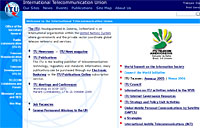 According to the latest figures from the International Telecommunication Union (ITU) in Geneva, Italy can now boast the highest mobile penetration rate in Europe, with mobile-mad Italians notching up 109.42 phones per 100 inhabitants.
According to the latest figures from the International Telecommunication Union (ITU) in Geneva, Italy can now boast the highest mobile penetration rate in Europe, with mobile-mad Italians notching up 109.42 phones per 100 inhabitants. With over four million UMTS users, Italians are also leading the way in 3G take up, with the ITU reporting that the country is the most prominent user of 3G services in Europe.
With over four million UMTS users, Italians are also leading the way in 3G take up, with the ITU reporting that the country is the most prominent user of 3G services in Europe. Mind you, it could be argued that Luxembourg’s high mobile ownership is equally skewed due to their nationals living in neighbouring countries needing a second handset for use within its borders.
Mind you, it could be argued that Luxembourg’s high mobile ownership is equally skewed due to their nationals living in neighbouring countries needing a second handset for use within its borders. Call us cynical if you like, but when we get a press announcement trumpeting some kind of ‘world first’ or another from someone we’ve never heard of, our eyebrows tend to arc skywards.
Call us cynical if you like, but when we get a press announcement trumpeting some kind of ‘world first’ or another from someone we’ve never heard of, our eyebrows tend to arc skywards. It is significant that content is breaking on mobiles before it’s in the shops and we’ve no doubt that mobiles will continue to play a greater part in the distribution of music and video, but we can’t really get excited about someone (even if they have got dazzling teeth) releasing a few snippets of a DVD for mobiles and then expecting the Guinness Book of Records to be calling them up.
It is significant that content is breaking on mobiles before it’s in the shops and we’ve no doubt that mobiles will continue to play a greater part in the distribution of music and video, but we can’t really get excited about someone (even if they have got dazzling teeth) releasing a few snippets of a DVD for mobiles and then expecting the Guinness Book of Records to be calling them up. In fact, we’re so unimpressed that we can’t even be bothered to give you the name of the video, but you can find it somewhere on Vodafone’s Dutch Live TV website, or just click around chirpy Frans’ website.
In fact, we’re so unimpressed that we can’t even be bothered to give you the name of the video, but you can find it somewhere on Vodafone’s Dutch Live TV website, or just click around chirpy Frans’ website. Did someone say fast?
Did someone say fast? Couch Potatoes Rejoice
Couch Potatoes Rejoice Internet? Break? Yeah right…
Internet? Break? Yeah right… Orange has become the first UK operator to sell an own-brand Windows Mobile handset operating on 3G networks, with the launch of the SPV M5000 smartphone.
Orange has become the first UK operator to sell an own-brand Windows Mobile handset operating on 3G networks, with the launch of the SPV M5000 smartphone. The silvery device stuffs in a loudspeaker and microphone for making conference calls, with a built-in modem and fax capability letting users blast off emails and check their appointments whilst making calls on the hands-free kit.
The silvery device stuffs in a loudspeaker and microphone for making conference calls, with a built-in modem and fax capability letting users blast off emails and check their appointments whilst making calls on the hands-free kit. The Economist is a publication that we regard highly. It’s not for nothing that they gained a strong reputation. Sadly a recent piece on the Digital Home let them down.
The Economist is a publication that we regard highly. It’s not for nothing that they gained a strong reputation. Sadly a recent piece on the Digital Home let them down. This was repeated with halls and halls of identikit stands. Remove the brand names and it would have been a challenge to tell them apart.
This was repeated with halls and halls of identikit stands. Remove the brand names and it would have been a challenge to tell them apart. Where The Economist got it wrong #2 – MSMedia Centre PCs are a failure
Where The Economist got it wrong #2 – MSMedia Centre PCs are a failure Deutsche Telekom have just announced that they will be rolling out 50 Mbit/s connection in 50 cities around Germany by 2007.
Deutsche Telekom have just announced that they will be rolling out 50 Mbit/s connection in 50 cities around Germany by 2007.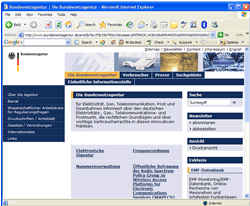 The “we’ll make the country globally competitive by installing high speed Internet access, but it needs to be made worth our while” argument has been used before by other incumbent telcos when they are trying to get good, or better deals from the regulators.
The “we’ll make the country globally competitive by installing high speed Internet access, but it needs to be made worth our while” argument has been used before by other incumbent telcos when they are trying to get good, or better deals from the regulators.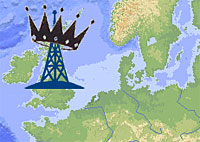 A report from consultancy firm BroadGroup has revealed that the deployment of wireless hotspots in Europe have soared by 67 percent in the six months up to May 2005.
A report from consultancy firm BroadGroup has revealed that the deployment of wireless hotspots in Europe have soared by 67 percent in the six months up to May 2005. As many a disgruntled transatlantic traveller may tell you, Wi-Fi access in Europe still remains considerably more pricey than the US market, although the report suggests that “price declines are continuing to trend downwards” (I think this means, “prices are going down”).
As many a disgruntled transatlantic traveller may tell you, Wi-Fi access in Europe still remains considerably more pricey than the US market, although the report suggests that “price declines are continuing to trend downwards” (I think this means, “prices are going down”). ‘The Man’ in the form of the EC wants to introduce regulation to the Internet by bringing in controversial rules to cover television online, according to a report in the Times.
‘The Man’ in the form of the EC wants to introduce regulation to the Internet by bringing in controversial rules to cover television online, according to a report in the Times.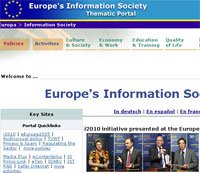 Internet-delivered TV is currently unregulated in the UK, so there is no compulsion for Web broadcasters to respect rules governing accuracy and impartiality or taste and decency that apply to all other analogue and digital channels.
Internet-delivered TV is currently unregulated in the UK, so there is no compulsion for Web broadcasters to respect rules governing accuracy and impartiality or taste and decency that apply to all other analogue and digital channels. The European Commission announced yesterday that it wants to give a boot up the backside of the European market for online music services by making it easier for new providers to get licences to flog songs over the Internet.
The European Commission announced yesterday that it wants to give a boot up the backside of the European market for online music services by making it easier for new providers to get licences to flog songs over the Internet.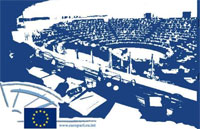 The European Parliament has voted overwhelming against a controversial bill that might have led to software being patented.
The European Parliament has voted overwhelming against a controversial bill that might have led to software being patented.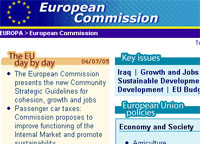 The bill was supposed to get rid of individual EU nations’ patent dispute systems and replace it with a common EU procedure. Instead, the old system of patents being handled by national patent offices will continue, without any judiciary control by the European Court of Justice.
The bill was supposed to get rid of individual EU nations’ patent dispute systems and replace it with a common EU procedure. Instead, the old system of patents being handled by national patent offices will continue, without any judiciary control by the European Court of Justice.